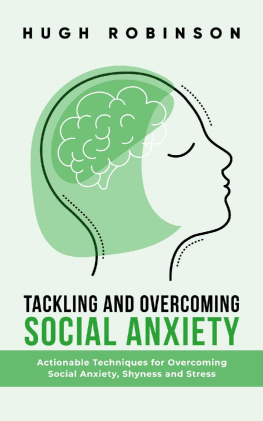Berent Jonathan - Beyond shyness: how to conquer social anxieties
Here you can read online Berent Jonathan - Beyond shyness: how to conquer social anxieties full text of the book (entire story) in english for free. Download pdf and epub, get meaning, cover and reviews about this ebook. City: New York, year: 1994;1993, publisher: Touchstone;Simon & Schuster, genre: Religion. Description of the work, (preface) as well as reviews are available. Best literature library LitArk.com created for fans of good reading and offers a wide selection of genres:
Romance novel
Science fiction
Adventure
Detective
Science
History
Home and family
Prose
Art
Politics
Computer
Non-fiction
Religion
Business
Children
Humor
Choose a favorite category and find really read worthwhile books. Enjoy immersion in the world of imagination, feel the emotions of the characters or learn something new for yourself, make an fascinating discovery.
- Book:Beyond shyness: how to conquer social anxieties
- Author:
- Publisher:Touchstone;Simon & Schuster
- Genre:
- Year:1994;1993
- City:New York
- Rating:4 / 5
- Favourites:Add to favourites
- Your mark:
- 80
- 1
- 2
- 3
- 4
- 5
Beyond shyness: how to conquer social anxieties: summary, description and annotation
We offer to read an annotation, description, summary or preface (depends on what the author of the book "Beyond shyness: how to conquer social anxieties" wrote himself). If you haven't found the necessary information about the book — write in the comments, we will try to find it.
Beyond shyness: how to conquer social anxieties — read online for free the complete book (whole text) full work
Below is the text of the book, divided by pages. System saving the place of the last page read, allows you to conveniently read the book "Beyond shyness: how to conquer social anxieties" online for free, without having to search again every time where you left off. Put a bookmark, and you can go to the page where you finished reading at any time.
Font size:
Interval:
Bookmark:



FIRESIDE
Rockefeller Center
1230 Avenue of the Americas
New York, New York 10020
www.SimonandSchuster.com
Copyright 1993 by Jonathan Berent and Amy Lemley
All rights reserved
including the right of reproduction
in whole or in part in any form.
First Fireside Edition 1994
FIRESIDE and colophon are registered trademarks
of Simon & Schuster Inc.
Designed by Irving Perkins Associates
Manufactured in the United States of America
16 17 18 19 20
Library of Congress Cataloging-in-Publication Data
Berent, Jonathan.
Beyond shyness : how to conquer social anxieties/
Jonathan Berent with Amy Lemley.
p. cm.
Includes index.
1. Anxiety. 2. Bashfulness. I. Lemley, Amy. II. Title.
BF575.A6B47 1993
155.232dc20 92-35206 CIP
ISBN 0-671-74137-3
ISBN 0-671-88525-1 (pbk)
ISBN-13: 978-1-4391-4769-6 (eBook)
Although names and identifying details have been changed, the essence of the stories contained here is true. The authors would like to thank the many individuals whose stories became the basis of this book.
We also wish to thank our agent, Jane Dystel, for her tireless effort in helping to shape this book and finding it a home.
Alice Mayhew and George Hodgman of Simon & Schuster are committed professionals, and we are grateful for their enthusiastic guidance.
Many thanks also to Eliran Eliaz, Ph.D., the worlds first Ph.D. in drama therapy, for his expertise, and to anthropologist Robert Vetter for his research.
Jonathan Berent wishes to thank Marcia Cohen for her true friendship and support.
Amy Lemley wishes to thank Sarah Bruce, Katie Chester, Jonathan Coleman, Jay Fennell, Norman, Laura, and Jane Lemley, and Julie Speasmaker for their support and encouragement during the writing of this book.
Anxiety: Friend or Foe?
Shyness. Weve heard this word a lot. At one time or another, all of us have probably thought of ourselves as shy. Indeed, research shows that 93 percent of all people have experienced shyness. What does it mean to be shy? For some, it may mean being quiet, reserved, or timid. For others, shyness is a catch-all word to describe what may at first seem like a personality trait, but is in fact a fear response that pervades their lives and prevents them from doing things that they would like to do, such as finding personal fulfillment and achieving career goals.
Over the years, in working with thousands of people who call themselves shy, I have come to realize that this word is too general to be of much help in identifying a problem and solving it. The actual response to the stress of interaction is called social anxiety. Of course, just as one person might say he is a little shy around women and another might say she is extremely shy about speaking in front of a group, it is also true that there is a wide spectrum of social anxiety, from mild nervousness all the way to social phobia, in which interaction-related anxiety is so extreme that a person actually avoids the specific situations that cause it. Avoidance, too, has its degrees, and can mean anything from being characteristically reserved at work, even though you have an idea or solution to propose, to refusing to attend social gatherings. Social phobiacommonly defined as performance anxiety in which the individual fears humiliation, embarrassment, or being evaluatedis quite common, and, according to a November 1991 article in the Journal of Clinical Psychiatry, is an emerging problem that is just beginning to receive attention: If the 1980s were considered to be the decade of anxiety, most would agree that panic disorder and obsessive-compulsive disorder received the most attention. The 1990s are sure to be another decade of anxiety, but we can expect other anxiety disorders to take the limelight, particularly social phobia. Until now, the article states, social phobia has been overlooked as a disorder, and I believe that mental health professionals have often looked at it as part of a general anxiety problem, lumping it together with other conditions. But social anxiety is a very specific problem. As a psychotherapist with more than thirteen years of experience in developing a program for individuals with social anxiety, I have observed that by nature, people with social anxiety are extremely resistant to getting help, so there is much about this population that has not been fully understood or studied. As for the increased awareness of social anxiety, I see it as an indication that technological advances and an increasingly competitive workplace are taking their toll on society. Further, I think families today are less able to hide or protect their socially anxious members. People with social anxiety can only benefit from this increased awareness. For some, a little information about how they respond to stress may be enough to minimize the anxiety response; for others, a more detailed application of overall strategies is in order. Whatever your social functioning level, this book can help you to work through your anxiety to be a more productive and fulfilled human being.
As you begin your exploration of social anxiety, it is important to grasp some basic concepts. First, understand that shyness and social anxiety are two closely related dynamics: Both terms describe a learned response to social interaction. In unfamiliar situations, or even familiar situations whose outcome may be unknownmeeting new people, giving a speech, asking someone for a date, negotiating a raisea shy or socially anxious person may hesitate to pursue the things he or she is interested in, or even begin to avoid situations that cause nervousness or anxiety. For example, if you fear that asking your supervisor to explain a basic point at work will make you appear stupid and you therefore avoid asking questions, you are allowing your social anxietyyour fear of humiliation or embarrassmentto control your actions and inhibit your career success. In your personal life, feeling out of place at parties because of anxiety might lead you to decline many social invitations. When you fear rejection, the interactions you do have can become unsatisfying. Your anxiety can prevent you from giving all you can to a conversation and can prevent others from responding fully to all you have to offer.
I call this fear response interactive inhibition. How does interactive inhibition affect you? At work, you may stay in a safe job, in which all duties are clear and manageable although no longer challenging, rather than ask for more responsibility or look outside your company for a change. In your personal life, you might hesitate to get close to people, although you have friends to socialize with. Your inhibited emotion may inhibit the quality of intimacy.
When your interactions are inhibited by social anxiety, you are unable to get as much out of life as possible, and so a harmless personality trait can become a major obstacle that stands in the way of fulfillment and productivity. But this doesnt have to be the case. Social anxiety is a learned responsea habit that can be broken. This book will show you, step by step, how to break the social anxiety cycle that may have caused loneliness in your personal life, decreased productivity in the workplace, and an overall lack of fulfillment. As you begin to understand that social anxiety is a combination of attitudinal, emotional, behavioral, and physical responses, you will see that
Next pageFont size:
Interval:
Bookmark:
Similar books «Beyond shyness: how to conquer social anxieties»
Look at similar books to Beyond shyness: how to conquer social anxieties. We have selected literature similar in name and meaning in the hope of providing readers with more options to find new, interesting, not yet read works.
Discussion, reviews of the book Beyond shyness: how to conquer social anxieties and just readers' own opinions. Leave your comments, write what you think about the work, its meaning or the main characters. Specify what exactly you liked and what you didn't like, and why you think so.











